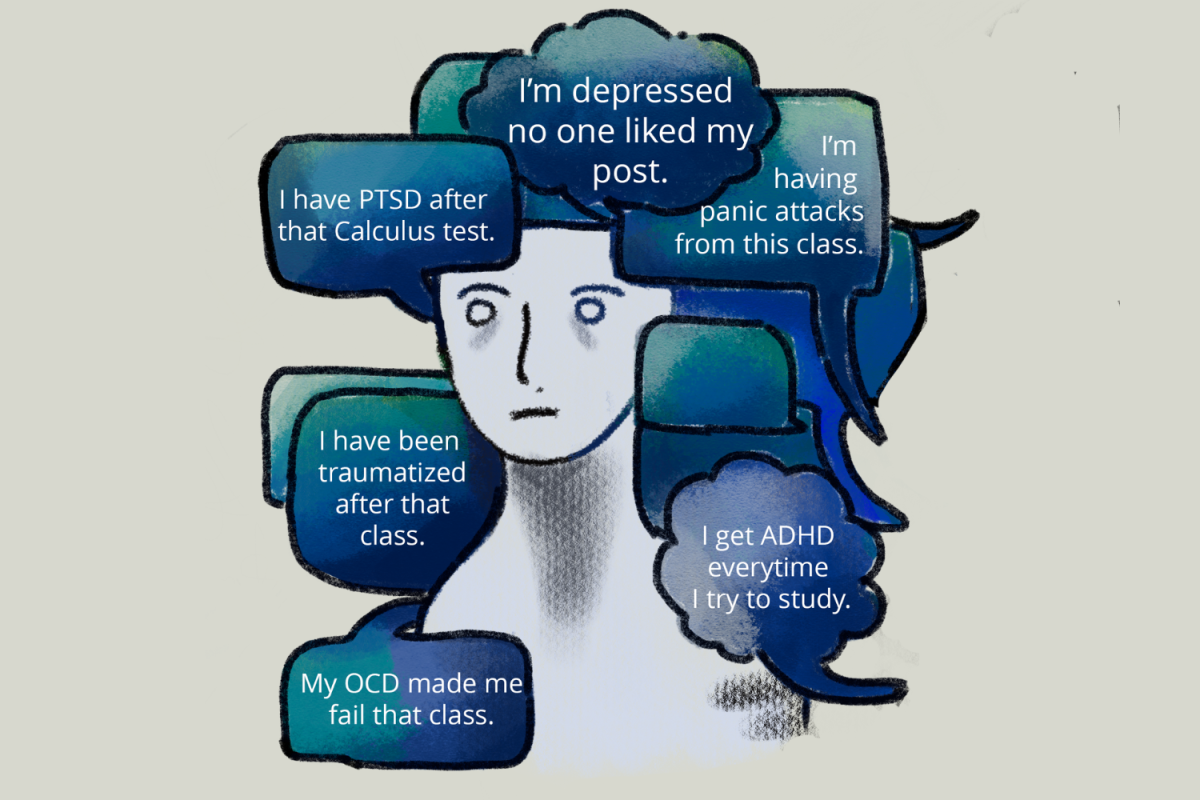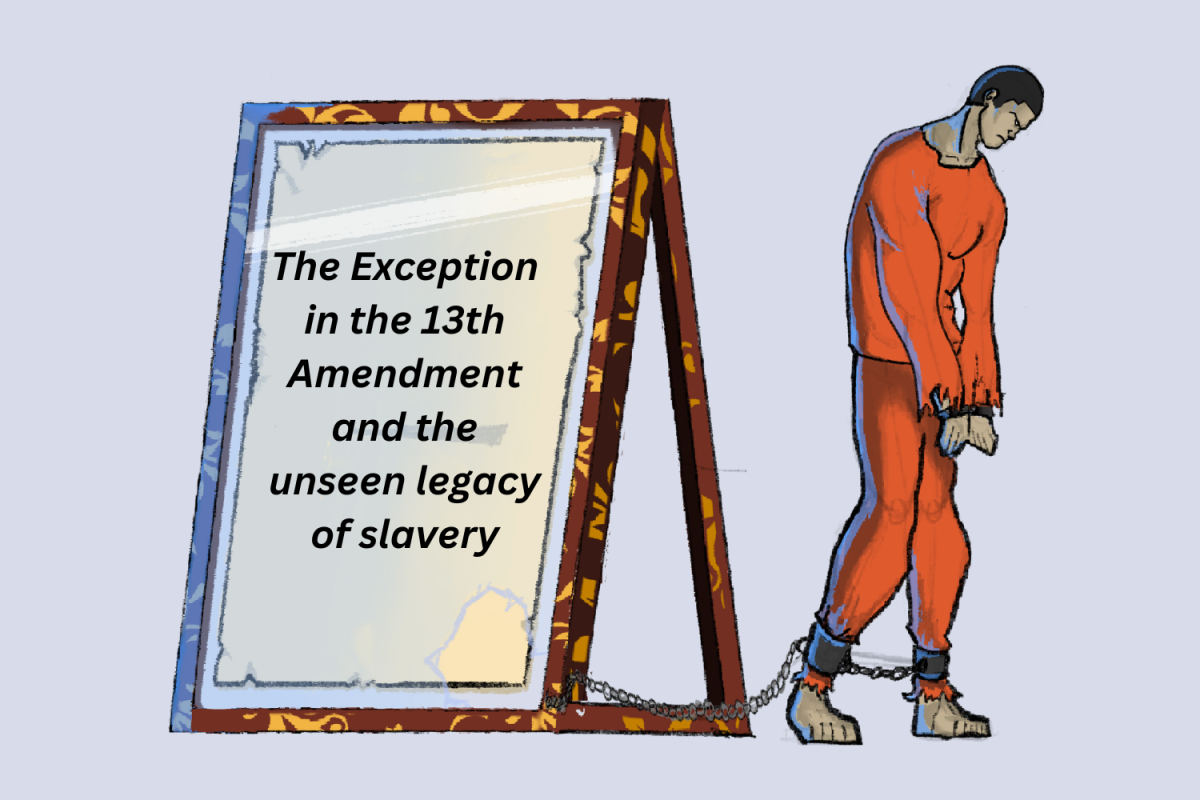As the week fluctuates through chilly winds to scalding sun rays, one student remarks that the “weather is so bipolar.” Relaxing in a room devoid of trash, sheets freshly folded, another student claims they have “OCD” because they prefer to be organized. This casual use of mental health terms has grown increasingly prevalent. Although this misuse may seem trivial, using casual language regarding mental health can have harmful consequences and serve as a greater reflection of society’s prejudice toward those who struggle with various conditions.
In recent decades, mental health concepts have undergone a linguistic phenomenon known as “concept creep” where ideas are experiencing semantic inflation as terms expand from their scientific meanings to ones that include vaguely-related situations. Mental health terms such as “anxiety” and “depression” have been broadened to include less severe feelings of sadness or worry. Although concept creep acknowledges the suffering that mental health conditions inflict, it trivializes those illnesses and pathologizes regular emotions. According to a study from the National Library of Medicine on semantic change, this may lead to more dramatic responses to milder experiences.
“It’s very common for people to say that they’re bipolar or depressed when they don’t have the diagnosis,” said junior and vice president of the Psychology and Sociology Club Tanishi Bhushan. “It can be difficult to articulate their feelings.”
Mental health language is also associated with the phenomenon of semantic satiation, which occurs when repeated use causes a word or phrase to lose its meaning. This phenomenon erodes the seriousness of mental health conditions, downplaying the illness and diminishing debilitating conditions to everyday, simpler experiences.
“Words change over time — they lose potency and get defined in other ways,” school psychologist Brittany Stevens said. “One of the issues with using official labels casually is when they start to lose their actual meaning, different to how they’re used in a clinical setting.”
According to the World Health Organization, around 13% of 10- to 19-year-olds have experienced a mental health disorder. In addition, both depression and anxiety diagnoses in adolescents have increased over time from 5.4% in 2003 to 8.4% in 2012, as stated by the Children’s Health Center. Given the considerable number of teens who have been burdened by mental health issues, it’s crucial to be mindful in approaching and discussing these issues. To start, we should refrain from using mental health terms in a negative or joking manner.
“Among teens, there’s still this belief that there’s something wrong with you if you’re having issues with your mental health, which is strange because we’re more than just our bodies,” school therapist Jenna Starnes said. “We still have a lot of progress to make in terms of destigmatizing mental health and encouraging more teens to speak up about their struggles.”
There are a multitude of words used today that are derived from obsolete medical terms and are considered ableist or insulting due to their previous connection with mental health conditions. For instance, the word “lunatic” referred to mentally ill people in the “lunatic asylum.” It was later replaced by “insane” because people with mental health conditions were perceived as lacking reason. Once these psychiatric vocabularies were reformed, they shed their medical meanings to be used in colloquial settings while retaining some of their offensive connotation. These diagnoses still carry bias today; terms such as “loony” or “manic” are often used to label something as irrational or senseless, surrounding them with a deprecatory meaning.
Both negative stigmas and trivialization of mental disorders can decrease the likelihood of adolescents speaking up. Teens may feel as if they’re overreacting, and describing their illness to others turns strenuous since they are unable to differentiate their complex condition from stereotypes perpetrated by everyday slang. Discouraged from seeking help, they may suppress their struggles, leading to serious health problems later in life.
“Slang terms that are too lighthearted or funny can make people less likely to seek help because they feel like they’re making fun of themselves,” Starnes said.
Conversely, normalizing the correct use of mental health terms can enable teens to get the support they need and feel validated. Since these clinical labels, or mental health terms, possess a shared understanding, teens may use clinical labels as a way for others to understand their struggles, enabling them to communicate about their problems healthily and without fear of being misunderstood. Although it allows others to recognize their feelings, it masks people’s underlying problems because their true feelings are not expressed.
“The tendency to label is rooted in wanting your feelings to be validated, but your feelings are real whether or not there’s a label,” Stevens said. “It’s important to talk about your true symptoms and feelings.”
Social media plays a pivotal role in the normalization of mental health terms. As seen through a multitude of platforms, mental health slang surfaces in content trying to appear relatable through humor. Although a humorous approach can make conditions seem less intimidating, it oversimplifies mental health conditions because terms such as “hyperfixating” and “trauma” have become hyperboles. It can blur the lines between a joke and a serious call for help. On the other hand, using humor through slang can be a coping mechanism for those struggling, allowing them to distance themselves from their problems and let others know that they are not alone.
“A lot of people in the media joke about mental health, and it’s kind of like putting on a mask,” senior and Activities Director of Psychology Club Dorothy Ko said. “However, since this slang is being used so much, viewers can see that other people are going through it too, making them think it’s okay to ask for help.”
Although the casual use of mental health terms offers a lighthearted approach to difficult experiences, it’s important to be empathetic toward those who suffer from mental health conditions by talking with sensitivity and choosing accurate words to describe genuine feelings. Students should educate themselves on the severity and details of the conditions, as well as spread awareness and encourage discussion around them.
“Many people use labels for their feelings to be legitimized, since there’s a real meaning in having an actual diagnosis,” Stevens said. “However, people should say things that more accurately capture what they’re experiencing.”


































































